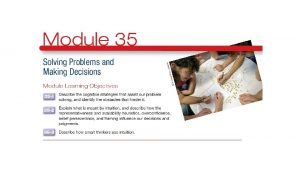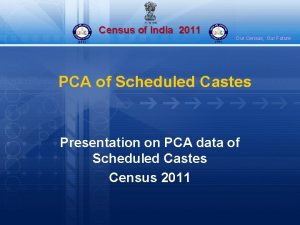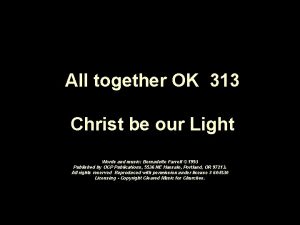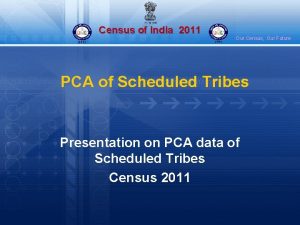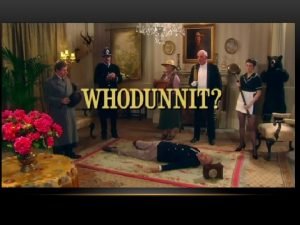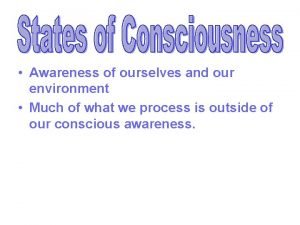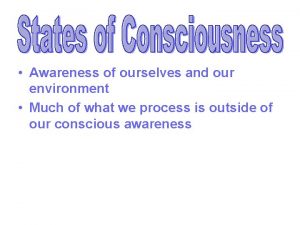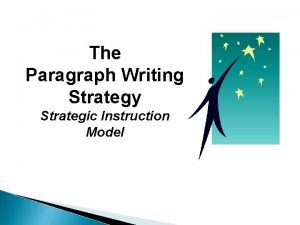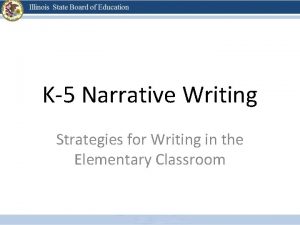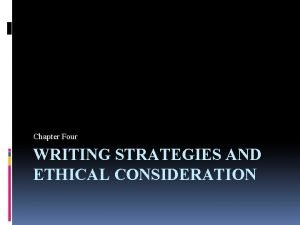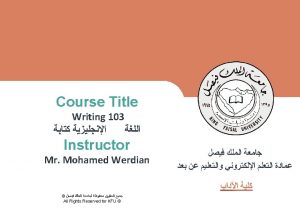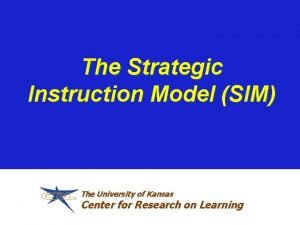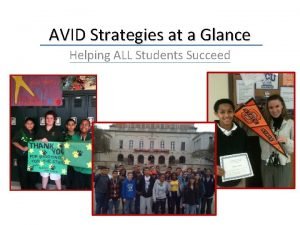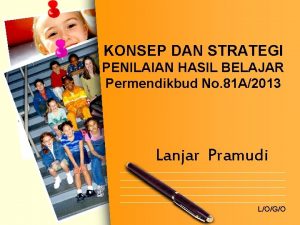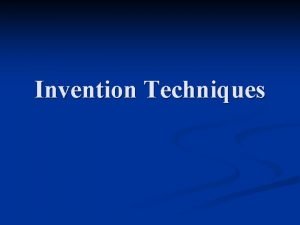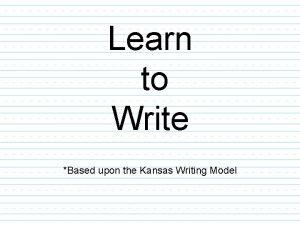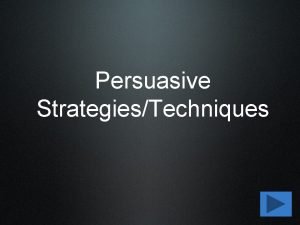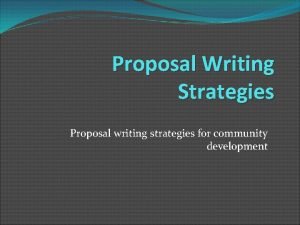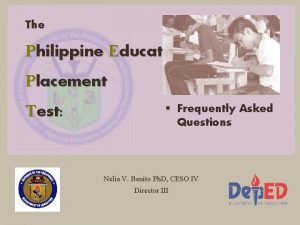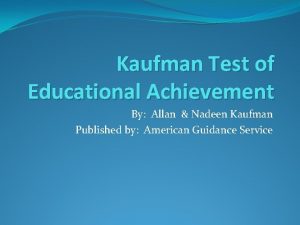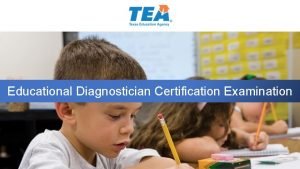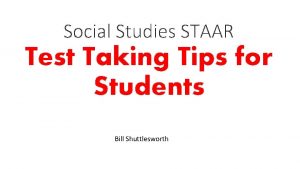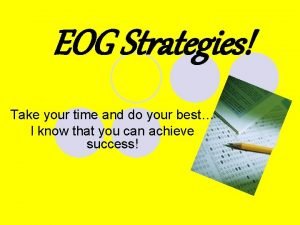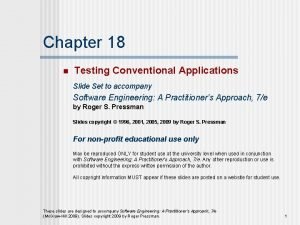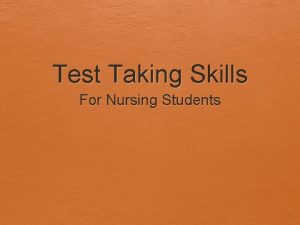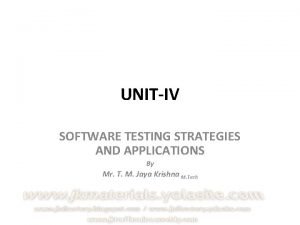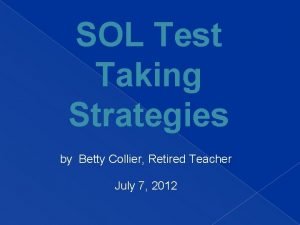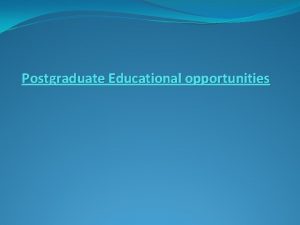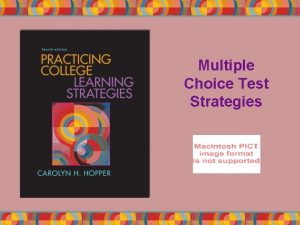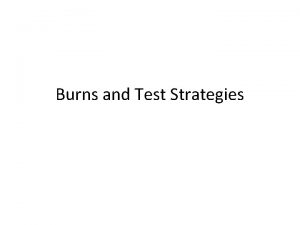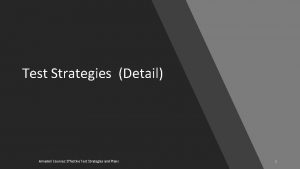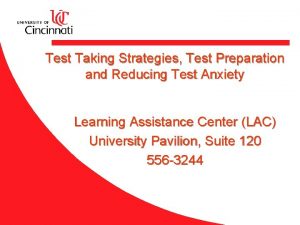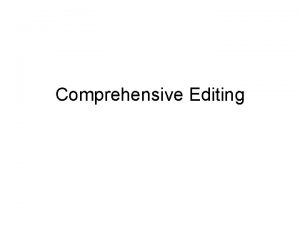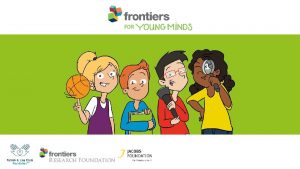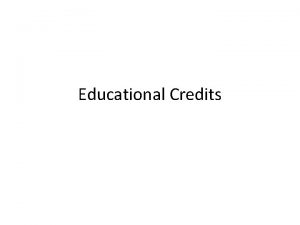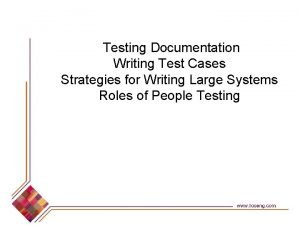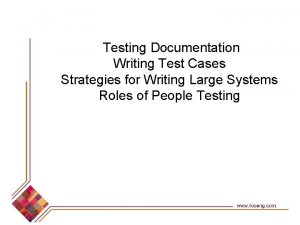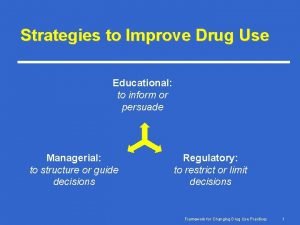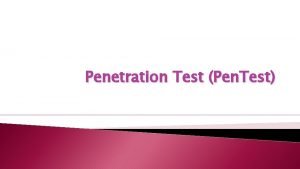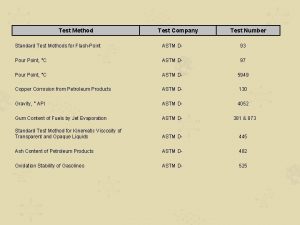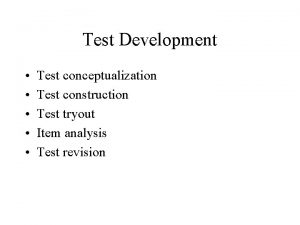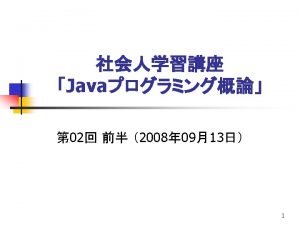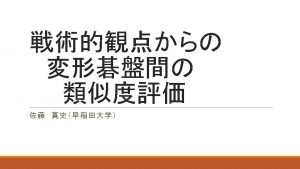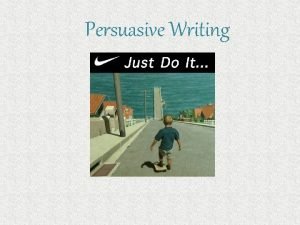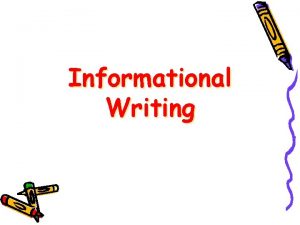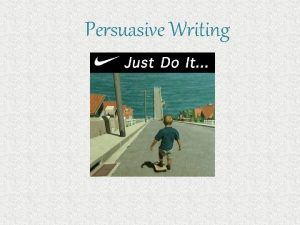TEST WRITING STRATEGIES Opportunities to Improve Our Educational







































- Slides: 39

TEST WRITING STRATEGIES Opportunities to Improve Our Educational Approach http: //www 2. palomar. edu/pages/testwritingstrategies

Many of us have no formal training in designing assessments.

What is a good exam? An accurate measure of student achievement of instructional objectives.

Problems • Too many questions or too few • Too little feedback • Ambiguous or unclear questions • Not offering a variety of test item formats

Features • Assesses mastery of topic • Provides feedback on teaching • Items vary in difficulty level • Questions are not easily answered without proper studying

General Design Tips • Not too long or too short • Clear, concise instructions • Use a variety of item types • Check for accuracy; proofread • Avoid answer dependency • Use humor!

In the Beginning • What should the students get from the chapters and sections? • What are the “big picture” goals? • What are common mistakes and misconceptions?

Technical Quality • “conformance to requirements” • “fitness for use”

Quality Criteria • Cognitive complexity • Content quality • Meaningfulness • Language appropriateness • Transfer & generalizability • Reliability • Fairness

Fairness Rules • Questions reflect course objectives • Expectations are clearly known • Each item presents a clear task • Ample time is allowed for completion • Scoring is determined before test is graded

Looking Closer

Bloom’s Taxonomy

• Recall of information • Interpretation • Grasping meaning

• Application of methods, theories, and concepts to new situations

• Identification of patterns • Recognition of components and their relationships

• Make judgments • Assess value of ideas, theories • Compare & discriminate between ideas • Evaluate data

• Generalize • Use old ideas to create new • Organize & relate • Draw conclusions, predict

The Value of Bloom’s http: //www. learnnc. org/lp/media/articles/bloom 0405 -3/bloompix. html

Level 1. Remembering When was this picture taken? Where was this picture taken? Question cues: List, define, tell, label Level 2. Understanding What is happening in this picture? Why are these boys dressed like this? Question cues: Describe, name, identify, discuss

Level 3. Applying How would you describe the photograph to others? What caption would you write for this photograph (say, in a newspaper)? Question cues: Modify, solve, change, explain

Level 4. Analyzing Why are these boys here and not in school? What do you know about their lives based on this photo? Question cues: Analyze, separate, compare, contrast

Level 5. Evaluating What is the significance of this photo for the time period depicted? Compare this photo with one of three boys from today of the same age. How are their lives similar? How are they different? Question cues: Give opinion, criticize, discriminate, summarize

Level 6. Creating What might these boys say about their work in an interview setting? What might they say about their future? Question cues: Create, construct, plan, role-play The photograph "Coal Breaker Boys" was taken in Kingston, Pennsylvania, between 1890 and 1910. It is available in the American Memory Collection Touring Turn-of-the-Century America: Photographs from the Detroit Publishing Company, 1880 -1920, from the Library of Congress.

Using Bloom’s • Verb lists • “Question frames”

Verb Lists

Verb Lists Science Math

Example Items • Remembering: “Name the act that began the Civil War. ” • Understanding: “Explain Brutus’ motivation for participating in Caesar’s assassination. ”

Example Items • Applying: “Use the Addition Method to solve this linear system. ” • Analyzing: “Draw a Venn Diagram illustrating the following argument. ”

Example Items • Evaluating: “Decide if this argument is valid and provide your reasons. ” • Creating: “Propose a solution to the traffic flow problem at this intersection. ”

Question Frames

Using Question Frames “Can you list three…” -- types of polygons? -- steps of cellular reproduction? “What facts or ideas show…” -- the likely diagnosis? -- the protagonist’s mindset?

Using Question Frames “What approach would you use to…” -- identify the mammal’s skull? -- change the mood of the music? “Can you make a distinction between…” -- Rockabilly and Folk songs? -- oxidation and reduction?

Using Question Frames “How would you select…” -- the bandaging method for a wound? -- the lighting for a scene? “What is the importance of…” -- the antagonist’s decision to leave? -- the concept of countability?

Even More Value Creates a culture of learning: • Encourages deep thinking • Models higher level thought processes • Appreciates cognitive challenges • Shows students depth of topics • Shows thinking is important

Knowledge Domains • Factual knowledge • Conceptual knowledge • Procedural knowledge • Metacognitive knowledge

Give It a Try Factual knowledge Conceptual knowledge Procedural knowledge Metacognitive knowledge Timer

Quick Summary • Write an accurate measure • Consider good test design • Know your testing goals • Consider technical quality • Use Bloom’s Taxonomy • Use verb lists, question frames • Consider knowledge domains

This slide show is available on the blog. As are my notes for each slide. The next direction for the blog is to study features of specific test item types. Thank You!

Talk prepared by Tracy Johnston as part of the STEM 1 grant of Palomar College August 2015 http: //www 2. palomar. edu/pages/testwritingstrategies
 What cognitive strategies assist our problem solving
What cognitive strategies assist our problem solving Thinking affects our language which then affects our
Thinking affects our language which then affects our Our census our future
Our census our future Christ, be our light
Christ, be our light Our life is what our thoughts make it
Our life is what our thoughts make it We bow our hearts we bend our knees
We bow our hearts we bend our knees Our census our future
Our census our future Our life is what our thoughts make it
Our life is what our thoughts make it We quail, money makes us quail. why?
We quail, money makes us quail. why? Awareness of ourselves and our environment is:
Awareness of ourselves and our environment is: Is our awareness of ourselves and our environment.
Is our awareness of ourselves and our environment. God our father christ our brother
God our father christ our brother Our future is in our hands quotes
Our future is in our hands quotes Awareness of ourselves and our environment
Awareness of ourselves and our environment Our awareness of ourselves and our environment
Our awareness of ourselves and our environment Lead paragraph example
Lead paragraph example Narrative writing strategies
Narrative writing strategies Writing strategies and ethical considerations
Writing strategies and ethical considerations Descriptive writing strategies
Descriptive writing strategies Sim writing strategies
Sim writing strategies Wicor strategies list
Wicor strategies list Strategi penilaian kurikulum 2013
Strategi penilaian kurikulum 2013 Invention strategies for writing
Invention strategies for writing Kansas writing strategies
Kansas writing strategies Advantages of observation
Advantages of observation Persuasive writing strategies
Persuasive writing strategies Proposal writing strategies
Proposal writing strategies Pept exam paper
Pept exam paper Kaufman test of educational achievement second edition
Kaufman test of educational achievement second edition Educational diagnostician (253) exam
Educational diagnostician (253) exam Social studies
Social studies Eog test taking strategies
Eog test taking strategies Test strategies for conventional software
Test strategies for conventional software Test taking strategies for middle school
Test taking strategies for middle school Test taking strategies for nursing students
Test taking strategies for nursing students Math multiple choice test taking strategies
Math multiple choice test taking strategies Test strategies for conventional software
Test strategies for conventional software Sol test taking strategies
Sol test taking strategies How to improve marketing performance
How to improve marketing performance Improve memory latency
Improve memory latency
